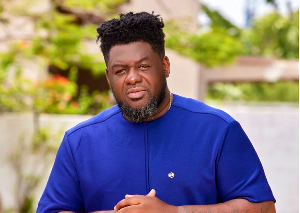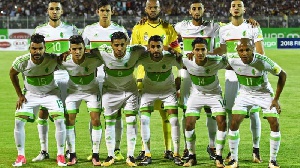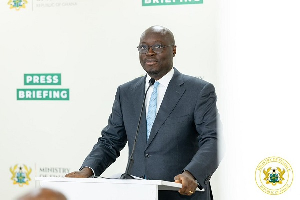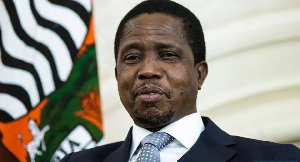An open and engaging Africa Cup of Nations is reaching its conclusion, with four final teams left standing ahead of Sunday’s semi-finals.
There are reasons for optimism for each of the quartet, all of whom have demonstrated their qualities—and their limitations—in the tournament to date.
Ahead of the competition, I predicted an all-North African final four, and while that expectation hasn’t come to pass, the two less-fancied teams from the region—Algeria and Tunisia—have made the semi-final line-up.
They’re joined by Nigeria and Senegal, who progressed at the ‘expense’ of my original pics for the final—Morocco and Egypt—despite not having to directly eliminate the pair themselves.
The failings of the Atlas Lions and the Pharaohs have been the two great shocking moments of this engrossing tournament, both coming at the start of the Round of 16, during a run of fixtures in which Nigeria and Cameroon also played out a 3-2 thriller in Alexandria.
The premature eliminations of Morocco and Egypt were compelling for different reasons.
The former displayed no shortage of quality and class against Benin, dominating the possession and the chances, but a combination of poor finishing, a loss of concentration in the final third, and simply, bad luck, took the tie to extra time, and then penalties, where the Atlas Lions’ nerve departed.
Certainly, there have been concerns about how effectively they’ve broken down teams at this tournament — they left it late to open the scoring against Namibia (own goal) and South Africa—but the North Africans’ dominance against Benin was such that with a bit more composure in the final third, they would have advanced.
Egypt’s elimination against South Africa was a different story, both because the Pharaohs were significantly weaker than expected, and because Bafana upped their game so notably at the Cairo International Stadium.
Their performance in the capital on July 6 was perhaps the best team performance of the competition so far; their strategy, to play a more intense, impactful, pressing style was bold, but it was effective, and the likes of Bongani Zungu, Dean Furman and Lebo Mothiba were imperious on the night.
While Morocco did show the kind of control and quality that justified my early faith in them—even though the results did not—Egypt failed to do the same.
There were worrying signs earlier on in the competition; Mohamed Salah coming deep to retrieve the ball in order to make things happen for his side, the ineffectiveness of Abdallah El Said, the Amr Warda distraction, the way all three group-stage opponents created chances against them, and a home crowd who, while vibrant, appeared to burn out during games.
Ultimately, while Egypt boast talented players, they were outperformed and outthought by a South Africa side who, on the day, played the occasion better.
Morocco and Egypt’s failure has left Algeria and Tunisia as the two North African teams standing, although they’ve also had their weaknesses exposed.
The Carthage Eagles were the biggest underachievers among Africa’s heavyweights during the group stage, drawing all three of their matches and riding their luck against Mauritania in their final game.
They could point to goalkeeping howlers as being the reason why they didn’t take all three points from their opening two games, while Mouez Hassen also had an outing to forget in the Round of 16 clash with Ghana that went to penalties, but Alain Giresse still hasn’t won over a large portion of the public.
They’ve been without Mohamed Amine Ben Amor, while Ferjani Sassi struggled for fitness ahead of the tournament, however, there’s been none of the attacking fluidity and invention that we’ve come to expect from the team in recent years, while the grizzled defensive unit—now much changed—has lacked ‘grinta’.
Nonetheless, Tunisia are still standing, and remain dark horses for the title.
In Wahbi Khazri, who made the difference against the Black Stars following his introduction, they boast a genuine match-winner, while Youssef Msakni showed glimpses of his best form in that dramatic meeting at 30 June Stadium.
Anice Badri, Yassine Khenissi and Naim Sliti all represent a goal threat, while Sassi should continue to grow into the tournament.
The 3-0 victory over Madagascar—inspired by Khazri and Msakni—should swell the confidence of a team who clearly appeared rattled when Rami Bedoui’s late own goal took the Ghana tie to extra time.
Algeria have, by and large, showed a quality—particularly going forward—that’s been superior to anything else we’ve seen in the Nations Cup so far.
Their front three—Baghdad Bounedjah, Riyad Mahrez and the excellent Youcef Belaili—combine well together and can hurt teams in many different ways, while in Adam Ounas and Andy Delort, they possess in-form difference-makers off the bench.
Even Islam Slimani had his moments after coming on against the Ivory Coast, while a midfield duo of Sofiane Feghouli and Adlene Guedioura is grizzled and inventive in adequate measure.
Ismael Bennacer has been one of the breakout stars of the tournament in the middle of the park, while Youcef Atal had also been magnificent—offensively and defensively—before his tournament was ended prematurely with a broken collarbone.
He represents a loss, although while Mehdi Zeffane is an able replacement, he steps into a backline that was exposed, turned over and unsettled when attacked—directly—by the intelligent movement and pace of the Ivorian attackers.
Max-Alain Gradel hit the woodwork early on in their quarter-final—serving an early warning sign—while Wilfried Zaha was clearly enjoying himself before his substitution.
They’ve coped with Senegal before, but Nigeria’s speedy attackers—notably the in-form Samuel Chukwueze—will be encouraged by the vulnerabilities in Algeria’s backline.
The Super Eagles and the Teranga Lions cannot be ruled out, of course, but neither have truly convinced.
The former have certainly picked up after two staid opening matches and that defeat by Madagascar, with Alex Iwobi, notably, growing into the tournament.
However, it remains to be seen if Gernot Rohr can truly prove decisive at this business end of competition, while doubts remain about a defence that lacked authority against Cameroon, and a forward line that ought to have killed off Bafana Bafana much earlier in their semi-final.
Senegal have been solid, but nothing close to spectacular, and they were arguably flattered by the underwhelming defensive displays of Kenya and Tanzania in the group stage.
Similarly, they had a tough time breaking down Benin in the quarter-finals—the Squirrels had the better chances during the first half—and similarly lacked dominance against Uganda in the previous round.
In Sadio Mane they possess a superstar, their defensive is solid, and Idrissa Gueye does his best to compensate for a lack of creativity in midfield, but it may not be enough to take them to the title.
Sports News of Saturday, 13 July 2019
Source: goal.com
Sorry Nigeria, North African duo remain best bet for Afcon crown
Entertainment












